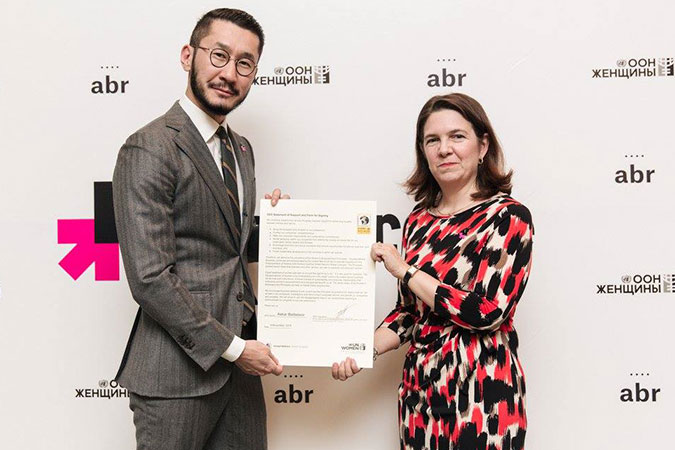Take five: “Managing a company is about managing talents, there’s no place for discrimination”
Date:

Askar Baitassov, Chief Executive Officer of Kazakhstan’s AB Restaurants chain talks about why the company champions gender equality. AB Restaurants is the first company in Central Asia to sign on to the Women’s Empowerment Principles (WEPs), a joint initiative of UN Women and the UN Global Compact, which places gender equality at the heart of good business practices. Mr. Baitassov has also joined UN Women’s HeforShe campaign.
Why did AB Restaurants decide to sign the Women’s Empowerment Principles?
AB Restaurants is the biggest restaurant chain in Kazakhstan, with 25 restaurants in several cities of Kazakhstan and 850 employees. A recent human resources analysis showed that 80 per cent of our employees are women. Moreover, 24 of the 25 restaurant directors are women and 90 per cent of restaurant managers are women. It’s not just about numbers—the most interesting, innovative ideas are coming from women and that’s why they are leading. We were proud of our female-led workforce, but when we looked at other companies and official statistics of the country, we realized that there are many barriers that women face in the workplaces, and not everywhere do women have the same opportunities. This prompted us to institutionalize the good practices and sign the Women’s Empowerment Principles so that AB Restaurants continue to improve women’s opportunities and foster gender equality in the workplace.
What are the barriers to women’s economic empowerment in your country?
It is not a secret that throughout Central Asia women face gender discrimination, persistent wage gaps and limited opportunities for career advancement. In Kazakhstan, although there are almost equal number of men and women in the workforce, and 44 per cent of small and medium-sized businesses are headed by women, only 4.2 per cent of large corporations have women at the helm. The gender wage gap is 33 per cent, and 70 per cent of wage workers in the health, education and social services are women. Working women carry the double burden of paid work and unpaid care work. They are expected to work 8 hours every day in the office and return home to do the “second shift”—caring for the household and children.
How is AB Restaurants supporting women now?
We have signed the Women’s Empowerment Principles and together with UN Women Multi-country office in Kazakhstan, called upon other companies to support gender equality. We have taken responsibility for all 7 principles of the WEPs. We have shown to the business community of Central Asia that companies can and should support women, not only children’s charity, which has been the trend. Together with UN Women we have engaged male opinion leaders, prominent Kazakh bloggers and journalists in an awareness raising campaign on women’s economic empowerment. The campaign also produced a public service announcement for screening in Kazakhstan cinemas. In addition, our media partner Buro 24/7 launched a month of gender and empowerment articles, interviews and opinion pieces on its platform We have distributed brochures on gender-related data and information at all our restaurants and engaged our own staff on the issue.
Has the company committed to take any actions under the Women’s Empowerment Principles?
What are the Women’s Empowerment Principles?
In a changing world of work, when businesses support gender equality in the workplace, everyone wins. The Women’s Empowerment Principles are designed to support companies in reviewing existing policies and practices—or establishing new ones—to realize women’s empowerment. Learn more»
Our company is already committed to all of the seven principles—establishing high-level corporate leadership for gender equality; treating women and men fairly at work; ensuring that women have safe and healthy workplace; training and building capacity of women, etc.--all of these constitute the basis of our corporate ethics. Most of our leadership positions are occupied by women and we will continue supporting them. We will be measuring progress on achieving gender equality further.
What has changed in AB Restaurants since they signed the WEPs?
Since joining the WEPs initiative in 2016, we have organized eight awareness raising sessions for all staff members of our restaurant chain, where everyone could raise issues that they were facing so that we could address them. We have also awarded capacity building/professional development grants to three women, and instituted maternity leave allowances for our female employees. The company is also considering adopting sexual harassment policy.